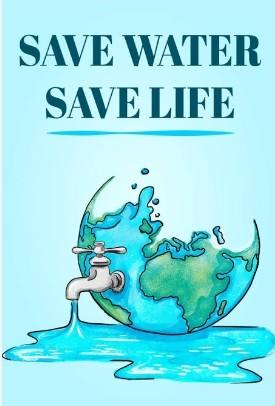Save Water: A Simple Yet Crucial Effort for a Sustainable Future
Water is one of the most essential resources on Earth. Without it, life would not be possible. However, despite its importance, water is becoming increasingly scarce due to population growth, climate change, and environmental degradation. Saving water is crucial not only for preserving this valuable resource but also for ensuring a sustainable future for generations to come.
Why Saving Water Matters
Global Water Scarcity: Over 2 billion people around the world currently live in areas experiencing water stress. As climate change impacts weather patterns, many regions are facing severe droughts and water shortages.
Environmental Protection: The overuse of water can harm ecosystems, rivers, lakes, and wetlands. When too much water is taken from these sources, plant and animal life is threatened, and natural habitats can be destroyed.
Energy Conservation: Water treatment, distribution, and heating require substantial amounts of energy. By using less water, we reduce the energy needed for these processes, thus contributing to lowering greenhouse gas emissions.
Economic Benefits: Reduced water consumption helps lower water bills for households and businesses. On a larger scale, water conservation can also reduce infrastructure costs for local governments.
Simple Ways to Save Water
Fix Leaks: A small drip can waste hundreds of gallons of water over time. Repairing leaky faucets, pipes, and toilets can make a big difference in water conservation.
Efficient Appliances: Install water-efficient appliances such as low-flow showerheads, faucets, and energy-efficient washing machines. These devices use less water without compromising performance.
Mindful Watering: Water your garden or lawn early in the morning or late in the evening to reduce evaporation. Additionally, choose drought-resistant plants that require less water.
Take Shorter Showers: Reducing shower time by just a few minutes can save gallons of water per day. Consider turning off the water while lathering up or brushing your teeth.
Use Full Loads: Only run your dishwasher and washing machine with full loads. This ensures that you are using water efficiently for each cycle.
Rainwater Harvesting: Collect rainwater using barrels to water plants or clean outdoor areas. This reduces reliance on treated water and helps conserve municipal water supplies.
Educate and Spread Awareness: Educating others about the importance of water conservation can lead to a collective effort in saving this vital resource. Encouraging your community to adopt water-saving practices can have a large impact.
Conclusion
Water is a precious resource, and we all have a role to play in conserving it. By making small changes in our daily habits, we can make a significant impact on reducing water consumption. Saving water is not just an environmental responsibility—it is a step toward a more sustainable and resilient future. Let's commit to using water wisely and inspire others to do the same.

